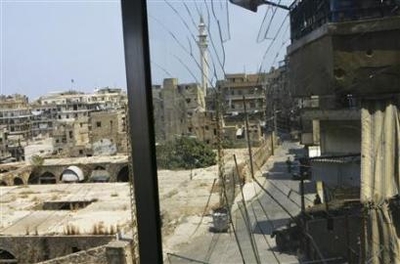 By Tom Perry , TRIPOLI (Reuters) – In Tripoli‘s most deprived areas, Lebanon’s lingering political troubles are being fought out in a sectarian conflict that threatens to cause more bloodshed.Scorched building facades indicate the frontlines of heavy battles between gunmen in the Sunni Muslim Bab Tibbaneh district and fighters in Jabal Mohsen — a neighboring hill which is home to Tripoli’s Alawite minority."After the battles, there is blood on the ground. Things will get worse," said Mohammed al-Saloum, one of hundreds of Bab Tibbaneh residents forced from their homes by fighting which has killed 22 people in the past two months. "There is fear."The battles have underlined the risk of more volatility in Lebanon, which was pulled from the jaws of a new civil war in May by a Qatari-brokered deal. The country’s rival alliances are far from full reconciliation.
By Tom Perry , TRIPOLI (Reuters) – In Tripoli‘s most deprived areas, Lebanon’s lingering political troubles are being fought out in a sectarian conflict that threatens to cause more bloodshed.Scorched building facades indicate the frontlines of heavy battles between gunmen in the Sunni Muslim Bab Tibbaneh district and fighters in Jabal Mohsen — a neighboring hill which is home to Tripoli’s Alawite minority."After the battles, there is blood on the ground. Things will get worse," said Mohammed al-Saloum, one of hundreds of Bab Tibbaneh residents forced from their homes by fighting which has killed 22 people in the past two months. "There is fear."The battles have underlined the risk of more volatility in Lebanon, which was pulled from the jaws of a new civil war in May by a Qatari-brokered deal. The country’s rival alliances are far from full reconciliation.
Residents in Tripoli, where Hariri has wide influence, say they are paying the price through a conflict between an Alawite faction linked to Hezbollah and an array of Sunni groups. "This struggle calms down for a while, then it opens up again," said Bilal Matar, a Sunni figure from Bab Tibbaneh. "The open wound is still there."
MUTUAL FEAR – The latest round of fighting, which lasted for two days, ended when the army deployed to stop battles between Alawite gunmen who belong to a pro-Syrian party and Sunni fighters. All Sunni leaders, even those allied to Syria, have been forced to take sides or risk losing popularity among Sunni constituents ahead of elections next year, explained Matar. "It’s these cheap electoral calculations," he said. In Bab Tibbaneh, fear has spread of sectarian massacres, said Matar. Alawites in Jabal Mohsen are concerned, especially by the appearance of gunmen in the garb of Islamist militants. The Alawite faith, an offshoot of Islam, is regarded as heretical by Muslim hardliners. Its followers in Tripoli say they fear for their very survival.
Threats have forced some to abandon property in Sunni areas. Abdullah Hourani, an Alawite, said he had evacuated his shop a month ago after receiving threats and relocated to Jabal Mohsen.
"We were able to salvage some of the goods. People came in and smashed up the place," he said.
"I’d had absolutely no problems (before). There was none of this sectarianism," he said. "The situation is not good at all. Our problem is that we are a minority in Tripoli… "
SHOOT TO KILL
Rifat Ali Eid, a senior official of the Alawite Arab Democratic Party, said shoot-to-kill orders had been issued to confront any attempts by gunmen to advance into Jabal Mohsen.
"If they try to get through the army, they will die immediately," he told Reuters at his office in Jabal Mohsen.
"We are talking about the existence of a sect. If things slip out of control, everything would be permitted," he said, behind him a photo of Syrian President Bashar al-Assad.
Eid accuses Hariri and Saudi Arabia, both foes of Syria, of instigating hostilities to weaken the Alawites in retaliation for Hezbollah‘s routing of Hariri loyalists in Beirut in May.
Hezbollah, a powerful faction backed by Syria and Iran, translated its military success into political gains in the Doha agreement. "What happened here in Tripoli is definitely a reaction to what happened in Beirut," Eid said.
But Hariri’s Future group holds Eid’s faction responsible for the violence, accusing it of seeking to advance the interests of Syria and Hezbollah and squeeze more concessions from Hariri. Future denies claims that it has a militia.
Residents talk of gunmen arriving from outside to set off hostilities. "There is someone igniting this fighting. Political forces are exploiting this old state of fear," said Matar.
"It’s a battle between states. Yes, there is a Syrian-Saudi struggle," he said. "I dream that there will be a settlement in Lebanon. For that, you need a settlement abroad."
"A ceasefire will not end the problem."
(Editing by Samia Nakhoul)



